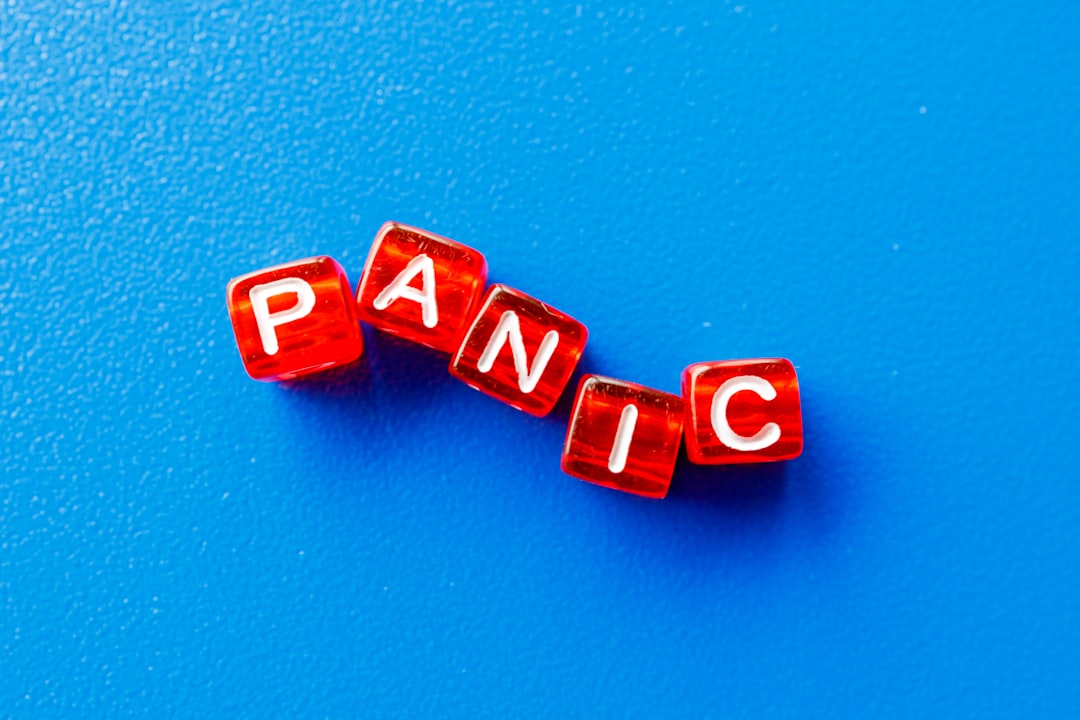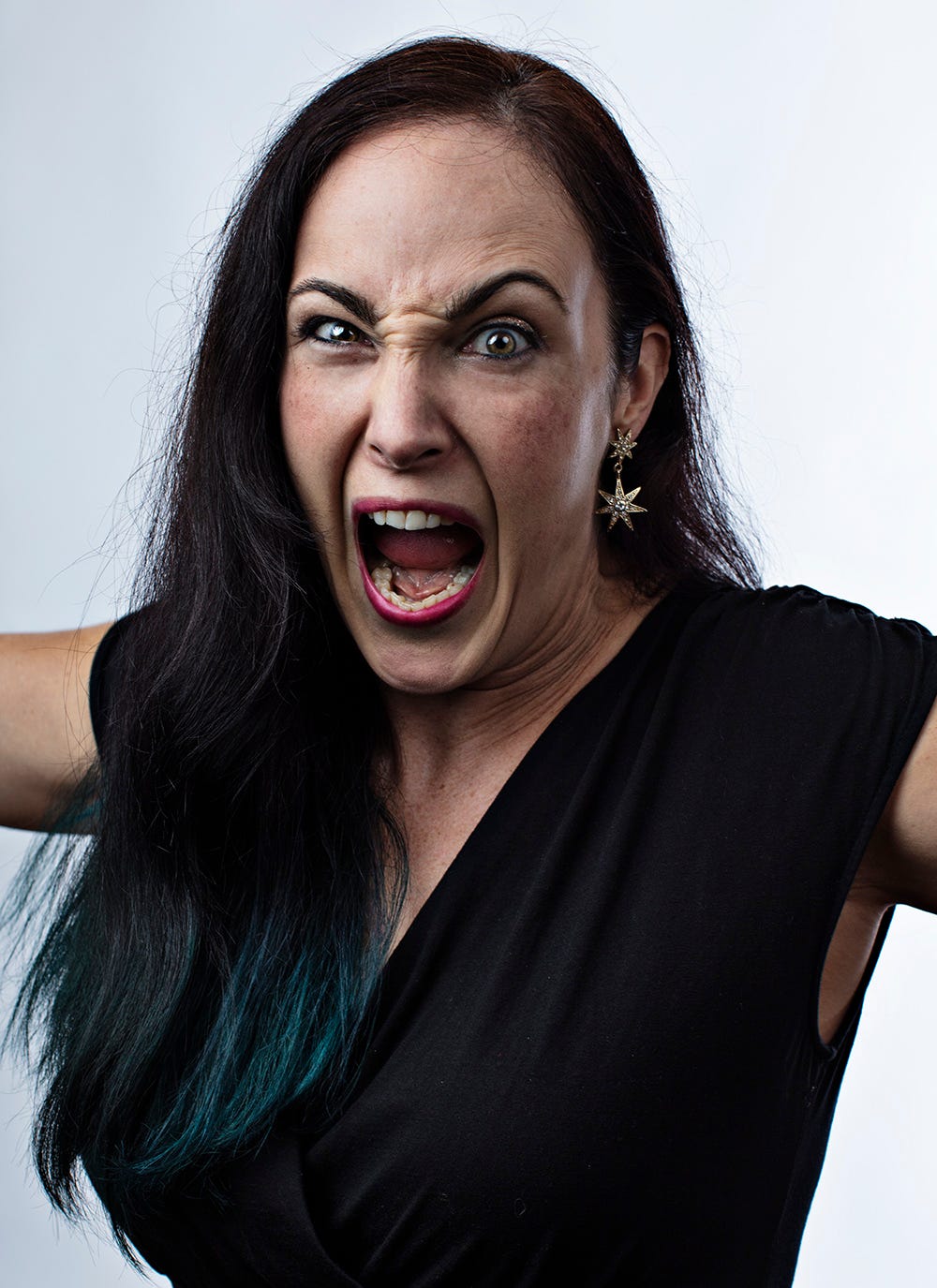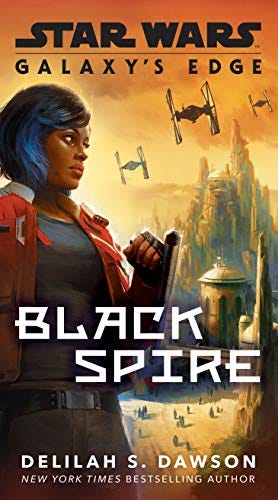I Am Anxious... Delilah S. Dawson
The bestselling author talks anxiety, C-PTSD, ADHD, and how she puts her fictional characters on realistic mental health journeys.
Delilah S. Dawson is a New York Times-bestselling author of over 22 books and many comics, including Hit, Mine, Camp Scare, Star Wars Galaxy’s Edge: Black Spire, Star Wars: Phasma, and the upcoming Disney Mirrorverse: Pure Heart.
She says this about her latest novel, The Violence: “This is my biggest and most personal book, which is centered on the kind of domestic violence I lived with as a kid, which definitely plays into my C-PTSD.”
You can find her on Instagram, Twitter, and on her website.
How long have you been an anxious person?
As long as I've been conscious. At least age 5.
What is your earliest memory of being anxious?
My dad was a narcissistic jerk who liked to terrorize me. When I was 4 or 5, he bought a realistic Halloween mask of a gross old man and would put it on to frighten me. I never knew when he'd pop out to chase me, and I'd scream and cry... and he'd laugh.
One time he did it during dinner, and I was so scared I threw a handful of green beans at him, and one of them stuck in the mouth hole of the mask. It surprised me so much that I laughed, inhaling a green bean and choking. He picked me up by my leg and beat me on the back until I coughed up the green bean, then screamed at me for throwing food. So for years, I was constantly expecting to be randomly terrified by someone I was supposed to trust.
He would also call me into the room while he was watching a horror movie so that I would walk in at the scariest part. He did this during Piranha, then at the lake, threw bread at me while I was on a float, and when the fish mobbed me, he told me they were piranha. Things only got worse as I grew older and he became increasingly abusive.

Have you ever experienced a panic attack?
Definitely. After I broke my back in my 30s, I was home alone with the kids while my husband was on a business trip. In the middle of the night, I realized that if there was some sort of emergency, like a fire, I wouldn't be able to pick up my small children and carry them out of the house, or fight with an intruder. I suddenly realized, as an adult, how helpless I was, alone in the woods and injured while caring for little kids, and that was my first panic attack as an adult. It took a lot of work to learn how to talk my brain out of having one.
What are some of your anxiety triggers? What makes you most anxious?
For me, sensory overload is the worst. If I'm too hot and also scared/feel threatened, if it's too loud or crowded, if my stomach hurts and there's no convenient bathroom, if lights are flashing, if I have indigestion and can't take a full breath. Pink Floyd and music from Queen's A Kind of Magic or Annie Lennox's Medusa hit me like anxiety lightning—that's the music my dad would play when he was drinking hard.
How do you feel physically and emotionally when you’re anxious?
I've described panic attacks in my books because I feel like folks sometimes don't know what they are and don't connect the bodily sensations with their emotions. It's a tightness in my chest, like my throat is blocked and I can't take a full breath. If it movies into a panic attack, I get very cold and have the urge to pace and speak quickly. My hands and feet go cold and my breathing speeds up. My body tells me that it's in trouble, that I'm dying, that I'm having a heart attack. Thanks, I hate it.
What do you do when you feel anxious? How do you take care of yourself in those situations? Do you have any anxiety management tips or tricks?
A lot of it is preparation, at this point in my life. I know how to eat when traveling so I don't have digestive problems or indigestion. I dress correctly for the weather so I don't get overheated and wear comfortable clothes so I won't feel constricted. I avoid crowded places unless I have a safe haven or an escape route. I bring my own safe foods so I don't have a blood sugar drop. I don't put myself into dangerous situations or go to any event where I don't have the freedom to move or leave if I need to. I only hang out with people I trust.
Being in control of my situation and knowing how to bail if necessary is hugely empowering for me.
In between Uber and protein bars, I rarely get panicked anymore. I also carry prescribed anxiety meds in my wallet at all times, just in case. The only thing that really gets me these days is bad turbulence on an airplane, and then it's half a Lorazepam and some breathing exercises. Yoga helped me a lot. One teacher told us, "No matter how contorted you are, how little space you have, you can always find one more breath," so I remind myself of that and do box breathing or 4-7-8 breathing to calm my heart rate before things get too bad.
How do you feel your anxiety affects your family, friends, and overall social life?
My kids definitely inherited my anxiety, so I've had to learn about myself to help them through it. It's eye-opening to have one kid diagnosed, then both kids, then yourself, then your spouse and realize your family is a hodgepodge of neurodivergent alphabet soup. Now that I know I have GAD, C-PTSD, ADHD, and probably ASD, I can see it less as,"Oh no, this random thing is happening to me," and more as, "I know myself and my limitations and my strengths; this is just chemicals, and I can think myself out of this problem."
I always had trouble making friends in the earlier parts of my life, but thanks to technology, I've found ways to connect with people who grok me and like me, weirdness and all. Using social media to 'meet' people before an event tricks my brain into thinking they're safe, so I can go to breakfast with a stranger at a con and feel like we're already friends, which is a revelation. As a writer, I often get to skip past awkward and anxiety-producing small talk and get right to Big Talk, or at least book talk, which makes social interactions far more pleasant.
When you're not feeling anxious (simply in your day-to-day life), what do you do for self care?
The biggest things that have helped me go from suicidally depressed and constantly anxious to actually pretty happy:
Get at least 7 hours of good quality sleep every night. SO IMPORTANT.
Exercise 6 days a week, mixing weightlifting with brisk walks outside, preferably with friends.
Clean up my diet. Quit gluten and lessen sugar and dairy. Eat more veggies. Up my protein to 100g a day at least. Drink more water. Quit caffeine. Limit alcohol to 2 drinks per week. Do blood draws so I can accurately supplement naturally occurring deficiencies due to my chronic illness.
Find a good therapist and be completely honest with them; make therapy work for me by being assertive about my needs and doing the deep work.
Reach out to friends by text or online to help maintain friendships, which I'm typically not great at due to ADHD object permanence.
Unmasking in general. Being honest about who I am and what my needs are. Cutting contact with toxic people or people who make me feel terrible. Block jerks on social media immediately.
Say no to work I will dread doing later. It's a HELL YES or it's a no, thank you.
How do you feel about the portrayal of mental health and anxiety in Pop Culture (books, movies, music, etc)? Do you feel it's accurate?
Sometimes yes, sometimes no! Instead of making a list of who did it well and who greatly offended me, I can just tell you that I make it a point to represent mental illness honestly in my books.
In Hit, the teen protagonist goes through realistic PTSD, and another character coaches her through a Memory Palace. In Mine, the middle grade drama queen protagonist is dealing with the fact that her father doesn't like her. In Camp Scare, the middle grade protagonist suffers realistic bullying and adults who ignore or gaslight victims instead of dealing with the real issue. In Star Wars Galaxy's Edge: Black Spire, it was important for me to touch on the fact that many Star Wars characters are veterans and are going to have PTSD and that a trip to a bacta tank can't cure the emotional toll of war.
I'm also including more ADHD and ASD characters as I explore my own diagnosis, which I didn't get until my mid-40s. I have never lived without mental health issues, so neither do my characters.
I don't write issues books, but I write books about people with issues who have adventures and discover their own strengths.
What is the best advice you've ever received?
"Keep your head down and inch toward daylight." - Matthew Stover, Heroes Die
That, and the Litany Against Fear from Dune. Basically, nothing can stop you but you. You keep going until you can't. Fear can't stop you from moving forward unless you let it. Fear is just a feeling, just chemicals. Sometimes those chemicals are right, and sometimes they are stupid.
These days, the strongest words in my mental health vocabulary are OH WELL. Didn't get what you wanted? OH WELL, keep going. Didn't get enough sleep? OH WELL, get more tonight. Said something stupid? OH WELL, apologize and move on. I don't dwell on the past or mourn what I didn't get, I just keep going. It's all about forward momentum.
That's the great thing about writing—the author is full of infinite books. You can query 100 books; it's not over until you stop writing. Your agent can take 100 books out on submission; it's not over until you give up. We are all filled with infinite possibilities, infinite stories. You just have to figure out what's getting in your way—which is probably you—say OH WELL, and keep going.
That's the thing: ultimately, once you're aware of your anxiety, it has no power. You can feel it, acknowledge it, and then take the next right step.
Editor’s Note: This interview was edited slightly for length and clarity.
Thank you, Delilah, for participating in the I Am Anxious… questionnaire. I am absolutely in awe of these answers and so appreciate the way you have worked so hard to include mental health in your work for years. Thank you!
If you are interested in being a part of the newsletter in the coming weeks and taking the I Am Anxious… questionnaire, please email me (scott.neumyer@gmail.com) and I’ll get you on the list! I’d love to have you. I would love to get to the point where we are sharing so many reader stories that I’m backed up for months.
Be well and keep talking.
DISCLAIMER: I am, by no means, a medical profession. If you need help, please seek qualified medical attention. This newsletter, while informative and fun, is no substitute for the real thing.







This is SUCH a good interview. Delilah is the bomb.
Wow. This is moving. I'm so glad we ran into each other in someone else's comments. You have a great backlist.